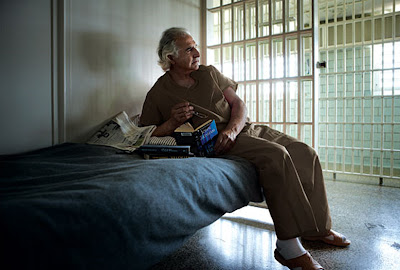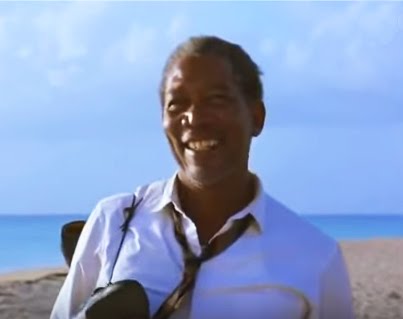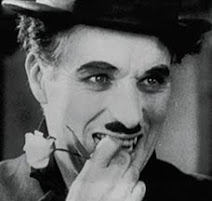Verdicts
 |
| Skulls placed behind glass at a memorial stupa made with the bones
of more than 8,000 victims of the Khmer Rouge regime at Choeung Ek, a
'Killing Fields' site located on the outskirts of Phnom Penh (Reuters) |
(In June, 2011, I noted then-recent articles about both Little Bernie Madoff and the beginning of an internationally-backed tribunal in Cambodia to prosecute the remaining leaders of the Kampuchean, Khmer Rouge regime for crimes against humanity.
(Yesterday, Reuters reported the tribunal reached its verdicts. "There were widespread and systematic
attacks against the civilian population of Cambodia, attacks through
many forms - forced transfer, murder, extermination, disappearances,
attacks against human dignity and political persecution," Judge Nil Nonn
said, taking an hour and 20 minutes to deliver the ruling:
(Nuon Chea, 87, the Khmer Rouge's chief ideologue and "Brother Number 2" in the KR's revolutionary line-up, was sentenced to life in prison. As he was sentenced, Chea sat motionless, but "his fingers were laced tightly as he could be seen gripping his hands together".
 |
| Nuon Chea At Sentencing (Photo: Mark Peters / ECCC) |
(Khieu Samphan, 82, the President of Kampuchea, was also sentenced to life, "listening intently" as the tribunal's verdicts were read.
 |
| Khieu Samphan During Verdict (Photo: Mark Peters / ECCC) |
(Sary's wife, Ieng Thirith, 82, the sister of Pol Pot, leader of the Khmer Rouge [and who died in 1998] and the Khmer Rouge's Minster of Social Affairs. She was recently diagnosed with Alzheimer's disease and deemed mentally unfit for trial.
(Her husband, Ieng Sary, the former Kampuchean foreign minister [and Pol Pot's brother-in-law], had been the sixth defendant but died in custody in 2012.
(Kaing Guek Eav [known as 'Duch'], had been commandant of Phnom Penh's infamous
Tuol Sleng prison
where at least 14,000 people were murdered. Put on
trial in 2009, he was found
amazingly guilty and given a reduced sentence in exchange for rolling over on his fellow
murderous thugs revolutionaries and testifying against them.
('Duch' did testify, but
the current tribunal had charged him with the other defendants, and sentenced him to spend the remainder of his life in
prison.
(Chea and Samphan, Ruters noted, face further hearings on separate charges of genocide in a second phase of the
complex trial.
However, further justice for the horrors perpetrated by the Khmer Rouge will probably be -- deferred.
(As so often happens in history, there are many former Killing Fields murderers and Tuol Seng torturers in the Cambodian government and its civil service. They, and those who enabled them during the Kampuchean tragedy, have a vested interest that "justice" will end with this trial of the remaining figureheads of the regime is complete.)
Cambodia's government includes remnants of the [Khmer Rouge]
regime and has been accused of being uncooperative... [current] Prime Minister
Hun Sen, a former Khmer Rouge soldier, has voiced his disdain for the
court and discouraged further cases... there have been no new indictments.
____________________________________________________________________
Little Bernie And The Angkor Killers
Little Bernie In His New Home (Peter Rad,
New York Magazine)
Looking through the
New York Times
online this afternoon, I came across two separate articles: One was a
footnote to a larger story about the sentencing of fraudster Bernard
Madoff by Judge Denny Chin, who recently commented on his reasoning in
sentencing Madoff to 150 years in prison. The other was a report of the
opening of a historic trial in Asia of four aging degenerates who, in
the mid-to-late 1970's, created and participated in what was the first
systematic genocide since the Holocaust.
Similarities
between the perps in both articles struck me in a particular way -- the
nature of people who commit crimes; how some criminals rationalize
their behavior, while others are incapable of comprehending the results
of their actions. That Little Bernie Madoff and the killers of Kampuchea
have more in common than at first glance.
In
Federal Court for the District of Manhattan in 2009, Bernard Madoff,
71, stood and listened as Judge Denny Chin spoke about the effect of
Madoff's twenty-year, ponzi-scheme fraud -- reciting stories of his
former clients' life savings, wiped out; of their inability to afford
care for older and sick parents or special needs children; of small
charities now bankrupt, their programs to benefit addicts, youth
offenders and the handicapped, all ended.
Chin called
Madoff's actions "extraordinarily evil", and then pronounced sentence:
Little Bernie would go to Federal prison for 150 years, the maximum
allowable term under law.
The New York Times noted today
that in a series of interviews since he began serving that sentence,
Madoff has taken issue with Judge Chin's description of him at the
hearing. He complains that he will die in prison, "away from [his]
family" -- that this is a punishment that does not, in his perspective,
fit the crime.
"To characterize me as this monster and
this evil person; I just think that was totally unrealistic and
unfair... In my mind, Chin was anything but fair, with zero
understanding of the [finance and investment] industry... [Judge Chin]
made me the human piñata of Wall Street [while financial firms and
government officials involved in the 2008 Crash and current financial
crisis] walk away free.”
Uh; yeah. This is the same Little Bernie Madoff who was described in A
New York Magazine online article
as no longer really hiding his lack of empathy for his victims, not
recognizing the scope or effect of his actions, even in prison:
But
that evening an inmate badgered Madoff about the victims of his $65
billion scheme, and kept at it. According to K. C. White, a bank robber
and prison artist ... Madoff stopped smiling and got angry. “F--- my victims,” he said, loud enough for other inmates to hear. “I carried them for twenty years, and now I’m doing 150...”
I've mentioned before
that Little Bernie, a textbook sociopath, doesn't show a shred of
remorse for what he's done or any real grasp of the twenty years in
which he did it.
He doesn't actually conceive that he's done anything wrong. It's all about
his feelings,
his nightmare... "as if," the
New York magazine article noted, "
he were the real victim."
Madoff
talks about the unfairness of his sentence -- essentially how free of
responsibility he truly considers himself to be. The extent of his
reasoning for his actions boils down to,
I'm the sacrificial goat for all these other crooks! Everybody was doin' it!
I'm
sure that perspective was a comfort to his son, who had been involved
in Madoff's business, and who committed suicide in 2010.
Then,
Madoff remembers to put the mask back on, the one that covered his true
reptilian features for so long; after the interviews mentioned by the
New York Times, Little Bernie sent follow-up notes which said, in part,
“My
comments should not be taken as an excuse for the pain and suffering I
have caused,” he wrote. In another message, he said he felt “completely
responsible and have remorse and shame for what I have done.”
Yeah, pal -- (
F___ my victims!") -- sure you do.
And (
as the NYT also reported)
in a courtroom half a world away in Phnom Penh, Cambodia, the trial of
the last four surviving leaders of the Khmer Rouge on charges of
genocide, war crimes, and crimes against humanity -- all committed over
thirty-five years ago -- began. The trial is "the centerpiece of a
United Nations-backed tribunal that has lasted five years, cost more
than $100 million and is intended finally to lay the past to rest."
"I Am Particularly Sorry For The Many Children That We Smashed
Against Trees." -- Kaing Guek Eav, 'Duch' (Actual Trial Quote)
Initially, the trial was to be of five defendants -- the fifth,
Kaing Guek Eav (known as 'Duch'), commandant of Phnom Penh's infamous
Tuol Sleng prison,
where at least 14,000 people were killed, was instead put on public
trial in 2009. Confronted by a host of witnesses, and by his own
meticulous records of torture and killing, Eav was convicted nearly a
year ago. He was sentenced to 35 years, but was since reduced to 19
years.
The Khmer Rouge, Cambodia's communist party, ran Cambodia (which it renamed Kampuchea) from 1975 to 1979.
Per Wikipedia,
The
Khmer Rouge attempted to turn Cambodia into a classless society by
depopulating cities and forcing the urban population ("New People") into
agricultural communes. The entire population was forced to become
farmers in labor camps. Money was abolished, books were burned,
teachers, merchants, and almost the entire intellectual elite of the
country were murdered, to make the agricultural communism, as Pol Pot
envisioned it, a reality...
The exact number of people
who died as a result of the Khmer Rouge's policies is debated, as is the
cause of death among those who died... Modern research has located
thousands of mass graves from the Khmer Rouge era all over Cambodia,
containing an estimated 1.39 million bodies. Various studies have
estimated the death toll ... most commonly between 1.4 million and 2.2
million, with perhaps half of those deaths being due to executions, and
the rest from starvation and disease.
The regime was
too fanatical and murderous for nearby Vietnam (which had been united
under communist rule from Hanoi since 1975), which invaded Cambodia in
1979 in order to liberate its population. The NVA drove the Khmer Rouge
into the jungles, from which it waged a guerrilla war with a
democratically-elected Cambodian government until 1989.
The defendants are old:
Nuon Chea, 84, the Khmer Rouge's chief ideologue (second in power only to the KR's leader, Pol Pot, who died a free man in 1998);
Khieu Samphan, 79, the President of Kampuchea, and his wife,
Ieng Thirith, 79, the Khmer Rouge's Minster of Social Affairs; and
Ieng Sary, 85, the former foreign minister and Pol Pot's brother-in-law.
All of them have lived quietly in comfort, even wealth, for roughly twenty years -- much like their
Capo,
Pol Pot. Even though he was acknowledged to be the driving force behind
the Khmer Rouge and its policies, and responsible for mass murder, he
was never arrested or charged, living quietly in a Cambodian village
near the Thai border and dying peacefully of natural causes in 1998.
Nuon Chea, The Khmer Rouge's No. 2 (Photo:
France 24)
Khieu Samphan, President Of Kampuchea (Photo:
UK Telegraph)
Ieng Thirth, Minister Of Social Affairs (Photo:
France 24)
Ieng Sary, Foreign Minister (Photo:
UK Telegraph)
As
the trial proceedings began yesterday, Nuon Chea (as the Khmer Rouge's
former Number 2, he is being seen as the lead defendant on trial) put up
his hand, said, “I am not happy with this hearing,” then rose from his
seat and walked unsteadily from the courtroom with the help of three
security guards.
Almost unbelievably for many
westerners, Cambodia is literally a society where the murderers walk
free: Thousands of former Khmer Rouge officers, officials, guards,
torturers, and executioners walk the streets and pathways of the country
without being charged with any crime.
Pol Pot, Khmer Rouge Leader, Shortly Before His Death In 1998
Try
to imagine what it would have been like if, in the aftermath of the
Second World War, nazis who had helped to murder millions, and imprison
and torture millions more, walked freely through the world, seen on the
streets of Europe, recognized by their former victims (not that this
didn't actually happen), and never charged with a crime.
However,
the current Cambodian government decided not to attempt mass
prosecutions of those who were the regime's mid-level officials, police
and soldiers. Instead, the government made it a national priority to
engage the entire country in a discussion -- part catharsis and part
historical closure -- about its past, similar to the South African
'Truth and Reconciliation' commissions after the end of Apartheid.
Children
-- all born after the years of the Khmer Rouge -- are taught the truth
of the past from a nationally-approved curriculum. Victims whose lives
were torn apart, who were tortured, imprisoned and lost members of their
family under the Khmer Rouge, speak out at public forums to testify
about their experiences.
Sometimes, much more rarely,
some of the perpetrators have come forward to admit to their actions and
talk about what it was like to be enforcers for the dictatorship.
The
only public Justice most Cambodians will ever see is in the trial of
these four, ex-Khmer Rouge defendants. Most of the principal leaders of
the KR are dead -- those who went on trial this week are symbolic
stand-ins for all the other murderers and
Mitwissers who continue to walk free.
Nuremberg Defendants In The Dock, 1947 (Photo: Wikimedia)
While
Little Bernie Madoff in his upstate New York, medium-security prison,
isn't a criminal on a par with managers of genocide and oppression, the
attitudes both evidence towards the 'unfairness' of their arrest and
trial is curiously similar.
... Mr. Nuon Chea’s
objection, as explained by his lawyers, pointed toward a separate
version of history in which the Khmer Rouge were national liberators,
guarding against Vietnamese incursions and motivated by heavy American
bombing in a secret campaign during the Vietnam War...
...Khieu
Samphan... the former head of state, has written a book in which he
states that he was unaware of the killings, and he has said he will give
the court his own version of history.
"His own
version of history"; In the minds of Chea, Samphan and Thirith, and Ieng
Sary, they were revolutionaries, and harsh methods have to be employed;
but they all deny any knowledge of the crimes committed in Cambodia
under their rule, which resulted from policies they created or orders
they gave.
For the nazis, their version
of history was a belief in race, and (for them) the criminality of those
whose only crime was to be a Jew, and other forms of
untermenschen.
The nazis lived in a self-justifying, alternate reality, and they clung
to the absolute certainty of their beliefs, the justification for
everything done in the name of
Volk and
Führer; how could they be wrong?
Ratko Mladic,
recently arrested in Serbia and delivered to the Hague, has a similar
perspective: Everything he did, he said, was to "protect" the Serbian
people -- presumably, from others whose only crime was to be a Muslim.
Madoff's version of history is simple:
Everybody was doin' it, and
They gave me 150 years, and they gave Goldman-Sachs $150 Billion. I'm
the victim here. And oh yeah right;
On advice of my counsel, I express remorse and shame for what I have done.
In
the minds of people who cause harm to others -- whether twenty years of
massive fraud for personal gain, or to the extent of mass murder --
there are always extenuating circumstances. There is an 'alternate
reality', where their explanations make sense; and where they -- not the
defrauded, or the maimed and the dead -- are the real victims.









































